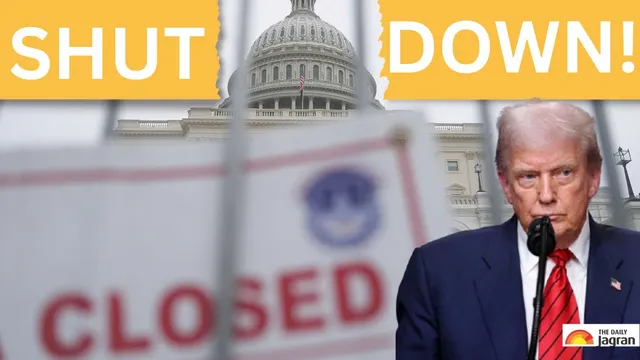- By Ajeet Kumar
- Tue, 30 Sep 2025 01:15 PM (IST)
- Source:JND
US Government Shutdown: A partisan standoff over health care and spending is threatening to trigger the first US government shutdown in almost seven years, with Democrats and Republicans in Congress unable to find agreement even as thousands of federal workers stand to be furloughed or permanently laid off. The government will shut down at 12:01 am Wednesday if the Senate does not pass a House measure that would extend federal funding for seven weeks while lawmakers finish their work on annual spending bills.
Why gold prices hit high
This resulted in gold prices rising to hit a fresh high on Tuesday and were poised for their best month in 14 years. According to news agency Reuters, spot gold was up 0.9 per cent at $3,866.90 per ounce, as of 0501 GMT. Bullion has risen 12.1 per cent so far in September, and is on track for its best month since August 2011, if current momentum persists.
US gold futures for December delivery gained 1 per cent to $3,894.90. "The looming government shutdown creates a haze of uncertainty over the market, which has served to accelerate gold's gains," Reuters quoted KCM Trade Chief Market Analyst Tim Waterer as saying. "The $4,000 level now seems a viable year-end target for gold whilst market dynamics such as lower interest rates and ongoing geopolitical hotspots keep working in favour of the precious metal."
ALSO READ: Trump Proposes 100% Tariff On Movies Made Out Of US, Threatens New Duties On Imported Furniture
What is a US government shutdown?
A federal government shutdown happens when Congress doesn't approve necessary appropriations bills, forcing affected agencies to pause non-essential operations since they lack legal authority to expend unapproved funds. From 1980 onward, the United States has endured 10 such disruptions, the longest and most recent spanning 35 days from December 2018 to January 2019.
What happens in a shutdown?
When a lapse in funding occurs, the law requires agencies to cease activity and furlough their “non-excepted” employees. Excepted employees include those who perform work to protect life and property. They stay on the job but don’t get paid until after the shutdown has ended.
During the 35-day partial shutdown in Trump’s first term, roughly 3,40,000 of the 8,00,000 federal workers at affected agencies were furloughed. The remainder were “excepted” and required to work.
What Democrats are demanding
Senate Democrats say they won't vote for it unless Republicans include an extension of expiring health care benefits, among other demands.
Democrats are pushing for an extension to Affordable Care Act tax credits that have boosted health insurance subsidies for millions of people since the COVID-19 pandemic.
The credits, which are designed to expand coverage for low- and middle-income people, are set to expire at the end of the year.
What does President Trump want
President Donald Trump and Republicans are refusing to negotiate at all, arguing that it is a stripped down, “clean” bill that should be noncontroversial. It was unclear, so far, if either side would blink before the deadline.
Vice President JD Vance, who was also in the meeting, said afterward, “I think we're headed into a shutdown, because the Democrats won't do the right thing.”
What will be the impact on the economy?
- A government-wide shutdown would directly reduce growth by around 0.15 percentage point for each week it lasted, according to Alec Phillips, chief US political economist at Goldman Sachs.
- Phillip Swagel, director of the Congressional Budget Office, said a short shutdown doesn’t have a huge impact on the economy, especially since federal workers, by law, are paid retroactively.
- But “if a shutdown continues, then that can give rise to uncertainties about what is the role of government in our society, and what’s the financial impact on all the programs that the government funds.”
- “The impact is not immediate, but over time, there is a negative impact of a shutdown on the economy,” he added.
- Markets have not reacted strongly to past shutdowns, according to Goldman Sachs Research. At the close of the three prolonged shutdowns since the early 1990s, equity markets finished flat or up even after dipping initially.
(With inputs from agencies)

